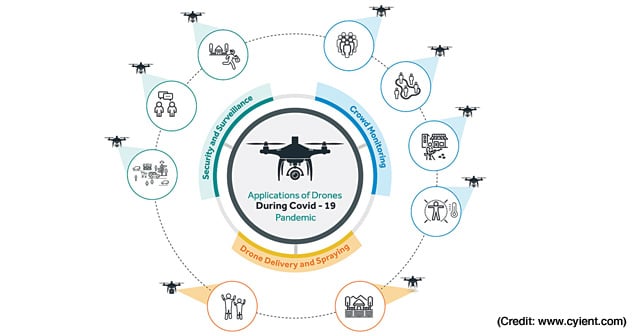- Contact Us
- +91-98111-55335
- [email protected]

How 3D printing is transforming Businesses
April 18, 2020
Aerial revolution in construction sector
May 8, 2020Drone Deliveries Thriving Amid Covid-19

As India continues to tackle the ongoing crisis, drones have been playing a key role in combating the novel coronavirus. Drone startups in India are working alongside authorities to provide services such as disinfecting contaminated areas, managing crowds and delivering medical supplies
The novel coronavirus is transmitted via respiratory droplets and can spread by touching contaminated surfaces like metal, floors, objects, and other surfaces indoors and outdoors. Remotely piloted drones are becoming vital tools in the fight against Covid-19 as they help to minimise human interaction and keep human operators safe from getting infected.
The law enforcement agencies across India are using drones to monitor crowded areas, ensure social distancing, disinfect contaminated areas, oversee cargo, and provide medical supplies. The drones are equipped with HD thermal cameras for surveillance, police sirens, flashing lights, and loudspeakers to reach places where people are congregating. Wireless technology is enabling the police to make lockdown-related public announcements over speakers, supply medicines, or other essential goods for families living in quarantine.
The drone based surveillance is assisting ground forces to take correct decisions on moving forces to sensitive or congested areas. Visuals from the cameras of drones are helping monitor the situation, condition of the streets, and rooftop of the buildings to know if there are any projectiles, missiles, or stones kept there.
The governments of Telangana and Kerala are using a variety of drones for monitoring the public on roads, disinfectant spraying, and delivery of services. Similarly, Assam is using drones to keep an eye on religious places and large gatherings at markets and public places. Maharashtra is using data analytics and drones to deal with containment in crowded places like wholesale markets. To make sure citizens are safe and are inside their homes, Hyderabad is also using drone technology for surveillance of the city. The Gujarat police have deployed drones in Rajkot, meanwhile, Uttarakhand police also monitored the situation in Dehradun with the help of drone cameras.
Jammu and Kashmir police have also deployed drones for service in Srinagar as well as other parts of the valley to monitor the Covid-19 situation and make people aware of the restrictions imposed by the administration. To check whether there are any violations of prohibitory orders, the Delhi police and civic agencies have adopted drones as an extension of their forces. They are using drones extensively to watch ration shops, banks, and religious places in every subdivision, where people gather.
Many cities like Lucknow, Raipur, Agra, Guwahati, and Meerut are using drones to ensure the effective implementation of Covid-19 lockdown and mitigate the spread of the virus in the towns. The local police and administration in Noida are using drones for better surveillance to track and manage vehicular traffic and crowding of people in public places. The drones with thermal imaging technology (cameras) are providing a live feed to the police in the command control room during night time as well and even in areas where there are no streetlights.
Drone startups in India are working alongside authorities to provide drone services. FlytBase drones are delivering medicines, first aid kits, and emergency supplies to homes and hospitals, and aerial disinfection at scale. Marut
Drones are now helping the Telangana government. GarudaUAV is working with the local police and administration in Noida. Navi Mumbai based ideaForge, a manufacturer of drones for defense, security, and industrial applications, has provided the equipment to Maharastra government.
The biggest challenge during this opportunity is to assemble the right kind of drone in this lockdown when spares and parts are not immediately available. Also, payload customisation for non-regular use cases is another challenge. Further, drones are currently deployed at different locations across India, so moving them across the country is another challenge.
A drone’s small size and flight capability allow it to access areas that otherwise may not be easy or possible. Typically, they are equipped with computer vision, camera, face and object recognition, and a combination of networking, robotics, and artificial intelligence (AI) to perform as demanded by the situation. It collects information, makes decisions based on AI, and acts on them to prevent viral transmission.
—Deepshikha Shukla
